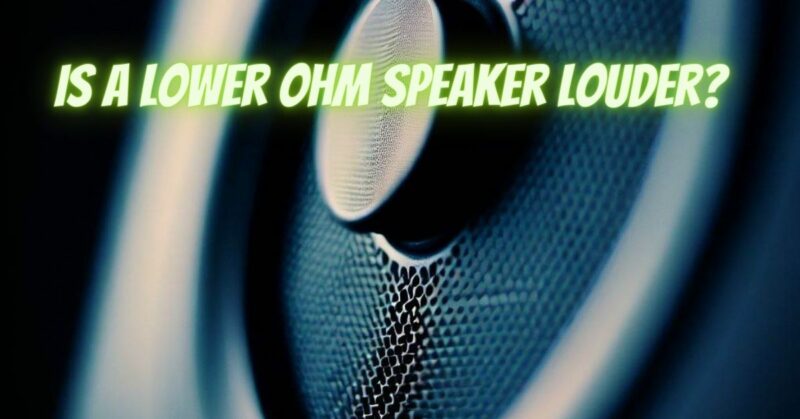The world of audio equipment can be complex, and terms like speaker impedance often lead to misconceptions about their impact on sound performance. A common question that arises is whether a lower ohm speaker is inherently louder. In this article, we will delve into the relationship between speaker impedance and sound volume to provide a clearer understanding of how speaker ohms affect loudness.
Understanding Speaker Impedance
Speaker impedance, measured in ohms (Ω), represents the resistance a speaker presents to electrical current flowing from an amplifier. It’s important to note that while impedance can influence loudness to some extent, it’s not the sole determinant. Other factors, such as sensitivity and amplifier power, also play crucial roles in the overall sound output.
Speaker Impedance and Amplifier Compatibility
A lower impedance speaker, such as one rated at 4 ohms, will draw more electrical current from an amplifier than a higher impedance speaker, like an 8 ohm model. This can lead to higher power consumption and potentially louder sound output. However, it’s crucial to pair the speaker with an amplifier that can handle the lower impedance load.
Amplifiers are designed to operate within specific impedance ranges, often indicated on their specifications. Using a lower impedance speaker with an amplifier not designed to drive such loads can result in overheating, distortion, or even damage to both the amplifier and the speaker.
Sensitivity and Sound Output
Another key factor influencing sound loudness is the sensitivity of the speaker. Sensitivity is typically measured in decibels (dB) and represents how efficiently a speaker converts electrical power into acoustic sound. A higher sensitivity rating means the speaker produces more sound output with the same amount of electrical power.
While lower impedance speakers might have higher current draw from the amplifier, sensitivity can have an even more significant impact on perceived loudness. A higher sensitivity speaker can make efficient use of the amplifier’s power, resulting in a louder sound even at the same impedance.
Amplifier Power and Sound Output
Amplifier power is a vital element in determining sound output. Amplifiers with higher wattage can drive speakers to produce more volume. However, it’s essential to understand that doubling the amplifier power doesn’t necessarily double the perceived loudness. In fact, doubling the amplifier power generally results in only a 3dB increase in volume, which is noticeable but not dramatically louder.
The relationship between speaker impedance and sound volume is nuanced, and it’s essential to consider several factors in understanding how impedance affects loudness. While lower ohm speakers can draw more current from an amplifier and potentially produce a louder sound, this is just one aspect of the equation. Speaker sensitivity and amplifier power also significantly contribute to the perceived loudness.
Ultimately, selecting a speaker with the appropriate impedance for your amplifier, while considering sensitivity and power handling, is crucial for achieving optimal sound quality and volume. Before making any decisions, it’s recommended to consult manufacturer specifications, seek expert advice, and take into account your specific audio setup and preferences.


